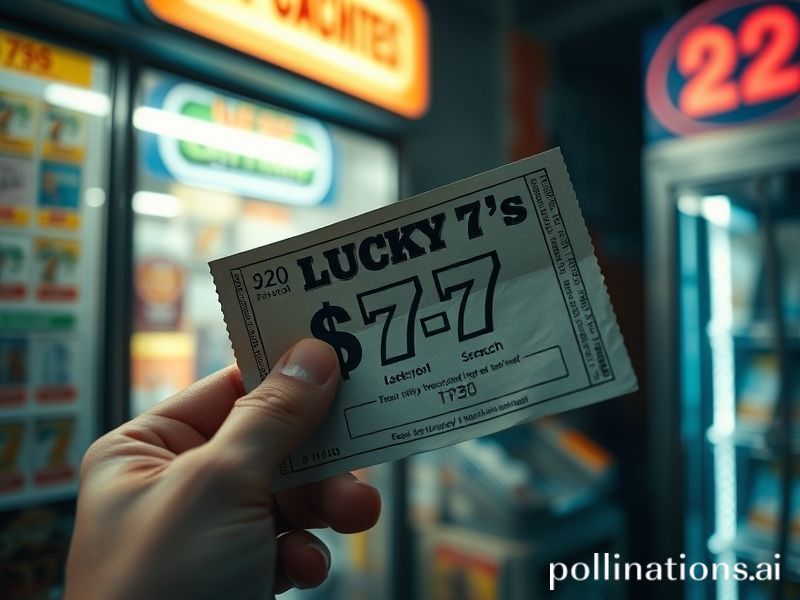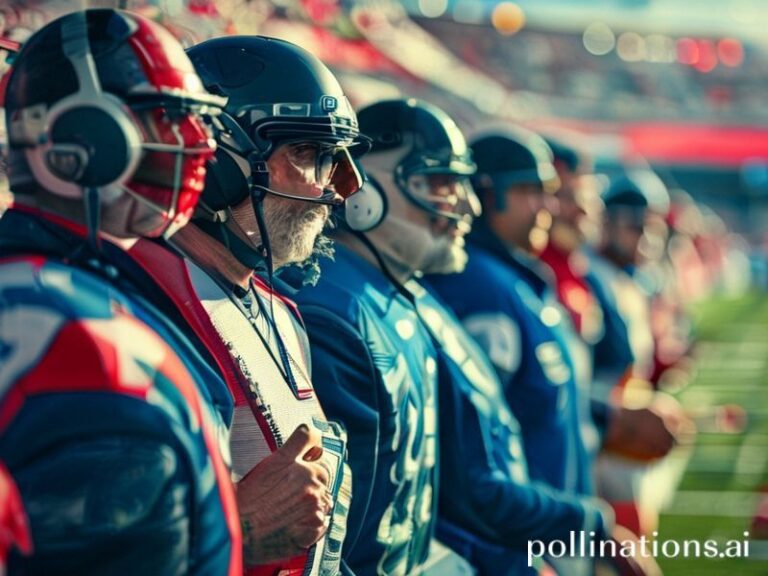Global Jackpot: How a 50-Cent Ticket Became Humanity’s Shared Tax on Hope
The Global Gospel of the Scratch-and-Pray: Why the World Gambles on Six Magic Numbers
By “Lucky” László Kovács, International Desk
Somewhere between the refugee camp outside Cox’s Bazar and the air-conditioned lottery kiosks of Madrid’s Barajas Airport, the same slip of paper is doing the rounds: a lottery ticket, flimsy as a cease-fire promise and twice as seductive. From Manila’s midnight “Lotto sa Bayan” queues—where minimum-wage nurses clutch hope in one hand and instant noodles in the other—to Canada’s polite provincial 6/49 draws that feel like a civic duty, humanity has agreed on a single lingua franca: “What if?” Scratch, pray, repeat.
The numbers are almost poetic in their cruelty. The World Lottery Association reports annual sales north of $300 billion—roughly the GDP of South Africa, or what Jeff Bezos spends on rocket fuel and divorce attorneys. Spain’s El Gordo alone shovels out €2.4 billion in prizes every December, a national nativity play where three Wise Men are replaced by 26,000 winners, most of whom will blow the cash on a bigger flat-screen and a smaller family. Meanwhile, in Haiti, where the per-capita GDP could be rounded down to a Powerball quick-pick, street vendors sell “bòlèt” on credit, because despair, like everything else, can be bought on layaway.
Scratch the surface—pun very much intended—and the lottery reveals itself as the world’s most honest tax. It doesn’t pretend to be progressive, moral, or even particularly random; it simply asks, “How much is your fantasy worth?” In Singapore, the answer is S$8.4 billion a year, enough to finance 40% of public housing and 100% of existential dread. In the United States, state lotteries have quietly replaced school levies as the preferred way to fund education, thereby teaching children two lessons: mathematics and nihilism.
The geopolitics of chance are equally tidy. Italy’s SuperEnalotto finances the national debt like a compulsive gambler refinancing his addiction with another credit card. China’s welfare lottery—official motto: “Helping the elderly, assisting the disabled, rescuing orphans, and relieving the poor”—makes sure the house always wins, especially when the house is the Communist Party. Across the border in North Korea, scratch tickets are technically illegal, which means Kim Jong Un’s inner circle plays in euros and everyone else plays in gulag coupons. Even war zones have their own informal draws; Syrian refugees in Zaatari camp trade Jordanian dinars for hand-drawn “lucky slips” that promise exit visas and dignity, prizes about as likely as a unanimous UN Security Council resolution.
Technology, ever the helpful villain, has globalized despair at fiber-optic speed. Crypto lotteries—imagine Powerball wearing a ski mask—let you wager Bitcoin on a provably fair algorithm, which is tech-speak for “still losing money, but now with blockchain.” Meanwhile, India’s lottery apps ping rural farmers with push notifications right after the monsoon fails, an innovation the UN calls “financial inclusion,” and the farmers call “Tuesday.”
Of course, every jackpot has its winners, those statistical unicorns who prove the rule by breaking it. Consider the 2016 Spanish cleaner who pocketed €190 million and promptly sued her own village for emotional distress after the mayor suggested she donate a new fire truck. Or the anonymous South African who won $112 million and vanished so completely Interpol suspects he may have become the first human to achieve negative celebrity. Their cautionary tales are dutifully ignored; hope, like herpes, is the gift that keeps on giving.
Economists call lotteries a regressive tax on the mathematically challenged. Sociologists call them a pressure valve for inequality. Marketers simply call them “engagement.” The rest of us call them Tuesday night. Because beneath the fluorescent glare of kiosks from Lagos to Ljubljana, we are all buying the same thing: a three-day fantasy in which we are not statistics.
And when the numbers don’t match—when the dream collapses into tomorrow’s coffee grounds—we do what any rational species would: we queue up again, wallets open, hearts clenched, ready to finance another round of global disappointment with the spare change of our better judgment. After all, the alternative—accepting the odds—is a jackpot nobody wants to win.







